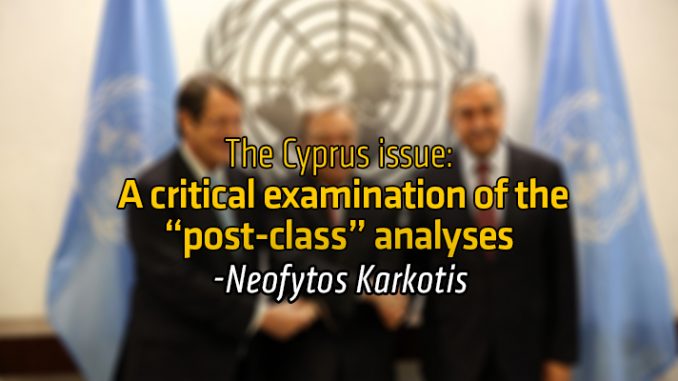
The present article aims to critically appraise the “dominant approaches” that consider the class analysis as an “outdated” tool for understanding the Cyprus issue. By synoptically presenting the factors which restructured the capitalist mode of production, it demonstrates how this parameter links with the emergence of different analyses which deem the class tools as insufficient for explaining the Cyprus issue.
The last 30 years, different factors led to the restructure of the capitalist mode of production, however without “eliminating” the exploiting nature of the capitalist relations of production (the exploiting antithetical relation between capital and labor remains the material field upon which the history develops). Accordingly, among others, the following factors are relevant to this restructure:
- Significant growth of the services sector (e.g. in the RoC controlled-areas the services sector makes up to 80% of the economy)
- Geographical relocation of the industrial labor (e.g. from Europe to Asia)
- Emergence of “immaterial labor” (information technology, digital labor, commons-based peer production, managing data and social media etc)
- “Post-Fordism” as a system of economic production
- Affective and cognitive aspects of work based on “interaction and knowledge” and not on “raw materials and natural resources”
This restructure contributed to various class situations mainly with the emergence of the (new) middle strata (legal/accounting services, intelligentsia, software developers, managers etc) and favored different “post-class” sociological analyses (e.g. post-modernism, constructivism, hermeneutics, micro-level, micro-sociology, aesthetic perceptions etc). These analyses, methodologically, do not perceive the social reality based on class/materialist terms and consider the class framework (capitalism-imperialism) as inadequate for investigating the social phenomena. Additionally, they do not accept that the economic sphere of production constitutes the field whereas collective subjects are formed, whilst for some of them the society is divided in individual units rather in collective ones (e.g. classes).
So, the ideological constituents of the above approaches include the concepts of: (a) post-industrial society, (b) knowledge society, (c) abolition of class struggle, (d) technological determinism creating post-capitalist societies (therefore, post-imperialist ones), and (e) identity politics replacing the model of social classes.
Interestingly, these approaches were developed also with regards to the Cyprus issue and its explanation. A mutual characteristic that these approaches share is that instead of analyzing and interrogating the cause of an issue, they concentrate only in the result. They do fetishize the outcome by giving up in explaining the objective material conditions that generated that outcome.
Among others, they main “post-class” analyses that emerged in the social sciences and are used for comprehending the Cyprus issue are:
- Hermeneutics – This analysis considers that the “individual will” is the main analytical framework (methodological individualism) to be used in order to understand a social phenomenon. Therefore, all the developments occur based on the “individual motivations” and “individual actions” shown by individual subjects (e.g. the political leaders). Consequently, in respect to the Cyprus issue, the hermeneutics approach believes that if, for example, Anastasiades and Akinci show the required “will” and “voluntarism” then the Cyprus issue will be solved. They proponents of this approach disengage the Cyprus issue from its historical context, the objective material conditions pertinent to it, and the various geostrategic interests of collective actors which affect the regional dynamics (e.g. NATO, USA, UK, Turkey, Greece, EU etc).
- Micro-sociology and Ethno-methodology – These analyses take exclusively elements such as nationalism, religion, cultural differences etc as the main conflicting fields cutting them off from the overall framework and historical stage within which they develop. Analyzing only the symptom (e.g. nationalism) and not the disease (e.g. capitalist-imperialism) without identifying the objective, materialistic conflicting field (epistemological relativism). For these approaches the society is not determined primarily by classes, but only through other terms and fields: ethnicity, tradition etc. The conceptual tool of imperialism (and its exploiting relations) has been “abolished” as the generative ground of the Cyprus issue, hence reality is only about “conflicting nationalisms” or “religious wars” or “cultural differences”. The Cyprus issue, for these analyses, is narrowed down simply as a problem of struggle between the Greek and the Turkish nationalism.
- Neo-Weberian and Neo-Marxist – These analyses ultimately conclude in disengaging the politics from economy, in detaching the sphere of production (imperialism) from the sphere of power (state, communities, markets etc). As a result, the primary factor (imperialism) for the creation of a situation (Cyprus issue) becomes a secondary one or even disappears, and a secondary one (e.g. elites’ antagonisms, nationalism, political will etc) turns into the primary root or even the exclusive root of causing the issue. Therefore, for these analyses the Cyprus issue is only about power-sharing antagonisms between the elites.
- Post-structuralism – This analysis, epistemologically and axiomatically, entails the view that not any objective reality and objective truth exist, and simultaneously denies the holistic approaches of capturing the social phenomena. Methodologically, it claims that all the issues (including the Cyprus one) are “social constructions” made by discourses (social constructivism). Multiple “narratives” and multiple “realities” can be conceived, therefore the point is which narrative is adopted or not. Accordingly, when the “narrative” and the “perspective” change then automatically the “reality” changes. Of course not in materialistic terms but in an idealistically irrational manner. This approach has been observed during the negotiation talks whereas different sponsored NGOs and apolitical organizations, without setting clear political positions even in the minimum level, requested “peace” and “solution” in an abstract and generalized manner. Illustrations of this were demonstrated during the whole negotiation process: by naming the imperialist peace as a “Cypriot ownership” agreement, by naming the imperialist organizations as “international community” and by naming the current belligerent occupation/colonial status of Cyprus simply as “division”.
In light of the above, it is crucial for the working class (and its social allies) in both communities to use the class analysis for comprehending the Cyprus issue and its dynamic developments, avoiding approaches that examine partial aspects and not the overall framework. The duties of the workers in Cyprus become even more imperative in forming a bottom-up, class-based, joint bi-ethnical movement for intervening in the historical process. Not as a follower of the bourgeoisie and as a passive accepter of the imperialist plans, but as an active political subject determining its parameters and political goals for the Cyprus issue.
As Lenin significantly argues:
“That is the only possible position of a genuine Marxist, of a genuine socialist and not a bourgeois reformist. Those who repeat the general, meaningless, non-committal, goody-goody desires of pacifism are not really working for a democratic peace. Only he is working for such a peace who exposes the imperialist nature of the present war and of the imperialist peace that is being prepared […]”
(V.I. Lenin, 1917, Bourgeoisie Pacifism and Socialist Pacifism)
1- https://www.marxists.org/archive/lenin/works/1917/jan/01.htm
Neofytos Karkotis


